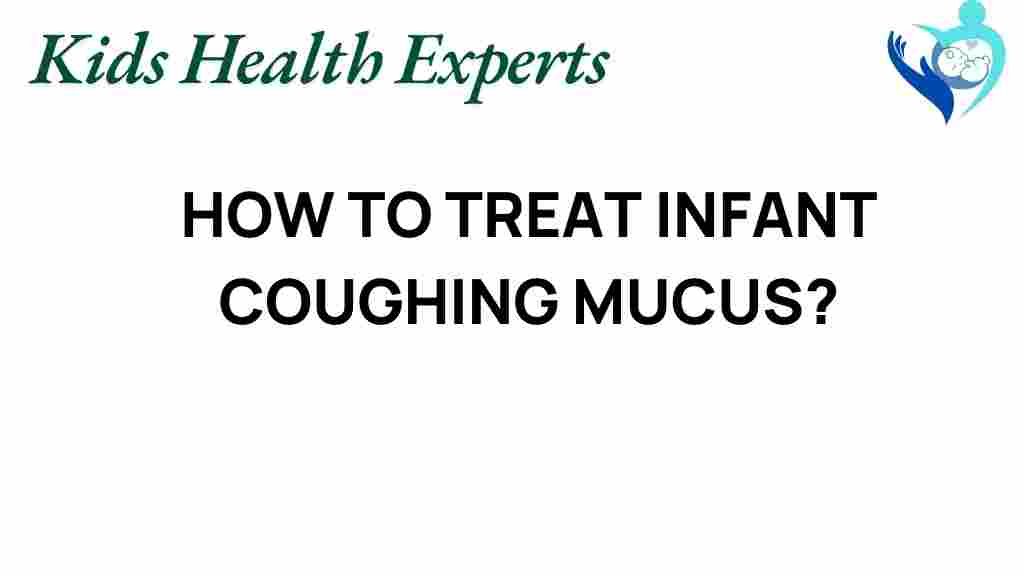Unraveling the Mystery of Infant Coughing: Effective Treatments for Mucus Relief
As a parent, witnessing your little one cough can be a distressing experience. Understanding the reasons behind infant coughing and how to provide effective mucus relief is crucial for maintaining your baby’s health and comfort. In this article, we delve into the complexities of respiratory care for infants, offering essential parenting tips, cough remedies, and pediatric advice to ensure your child’s wellness.
Understanding Infant Coughing
Coughing is a natural reflex that helps clear the airways of irritants, mucus, or foreign particles. However, when it comes to baby health, infant coughing can be more than just a simple reflex. It can indicate underlying issues such as:
- Common colds
- Allergies
- Respiratory infections
- Asthma
- Exposure to irritants (like smoke or strong odors)
Recognizing the type and severity of the cough is essential in determining the best course of action for mucus relief.
Common Causes of Coughing in Infants
Understanding the common causes of coughing can help parents make informed decisions. Here are some typical reasons for infant coughing:
- Viral Infections: Most coughs in infants are caused by viral infections, primarily colds.
- Bacterial Infections: Less commonly, bacterial infections can lead to coughing and may require medical intervention.
- Allergies: Allergies to dust, pollen, or pet dander can cause persistent coughing.
- Environmental Irritants: Smoke, strong odors, or pollution can irritate a baby’s respiratory system.
Identifying the Type of Cough
Not all coughs are the same. Here’s how to identify different types of coughs:
- Dry Cough: Usually indicates irritation in the throat and may be associated with allergies or dry air.
- Wet Cough: Characterized by mucus; it’s the body’s way of clearing out the airways.
- Whooping Cough: A severe, barking cough that can indicate a more serious problem; immediate medical attention is necessary.
Effective Treatments for Mucus Relief
Once you identify the cause and type of cough, you can begin to implement effective treatments for mucus relief. Here are some proven methods:
1. Humidifiers
Using a humidifier in your baby’s room can help add moisture to the air, making it easier for your infant to breathe and reducing mucus build-up. Ensure you:
- Clean the humidifier regularly to prevent mold and bacteria.
- Choose a cool-mist humidifier for safety.
2. Saline Nasal Drops
Saline drops can help loosen mucus in your baby’s nasal passages, making it easier for them to breathe. Here’s how to use them:
- Lay your baby on their back.
- Place 1-2 drops in each nostril.
- Wait a minute, then use a bulb syringe to gently suction out the mucus.
3. Chest Rubs
Over-the-counter chest rubs designed for infants can provide comfort and help relieve coughs due to congestion. Always check with your pediatrician before using any product, as some may not be suitable for very young babies.
4. Warm Baths
A warm bath can help loosen mucus and provide comfort for your baby. The steam from the bath can also help clear nasal passages.
5. Elevate the Head
When your baby sleeps, slightly elevating their head can help mucus drain and reduce coughing. Use a small pillow or folded towel under the mattress (never place pillows directly in the crib).
6. Encourage Fluids
Keeping your baby hydrated is crucial, especially if they have a cough. Offer:
- Breast milk or formula for infants.
- Clear fluids for older babies (after six months).
7. Seek Pediatric Advice
If your baby’s cough persists for more than a few days or is accompanied by other symptoms like fever, difficulty breathing, or wheezing, it’s essential to consult a pediatrician. Early intervention can often prevent complications.
8. Avoid Irritants
Protecting your baby from environmental irritants is crucial. Here are some tips:
- Avoid smoking near your baby.
- Keep your home free from strong odors (like scented candles or strong cleaning products).
- Ensure good ventilation in your home.
Troubleshooting Tips
As a parent, it’s important to know how to manage situations that may arise with infant coughing. Here are some troubleshooting tips:
When to Call the Pediatrician
Not all coughs require a visit to the doctor, but you should seek medical advice if you notice:
- Your child is having difficulty breathing.
- The cough lasts more than a week.
- There’s a high fever accompanying the cough (over 100.4°F).
- Mucus is yellow, green, or has blood in it.
Homemade Cough Remedies
Some parents may find relief in natural cough remedies. Here are a few safe options:
- Honey: For children over one year old, honey can soothe a cough. Never give honey to infants under one year due to the risk of botulism.
- Warm Water with Lemon: This can be soothing for older infants and toddlers.
Always consult with your pediatrician before trying new remedies, especially with infants.
Conclusion
Infant coughing can be a perplexing issue for new parents, but with knowledge and the right techniques, you can effectively manage it while providing mucus relief and ensuring your baby’s health and wellness. Remember to observe your child closely and seek pediatric advice when necessary. By following the tips and remedies outlined in this article, you can help your little one breathe easier and feel more comfortable.
For more information on children’s health, visit this resource. And for further parenting tips, check out our parenting blog.
This article is in the category Care and created by KidsHealthExperts Team
